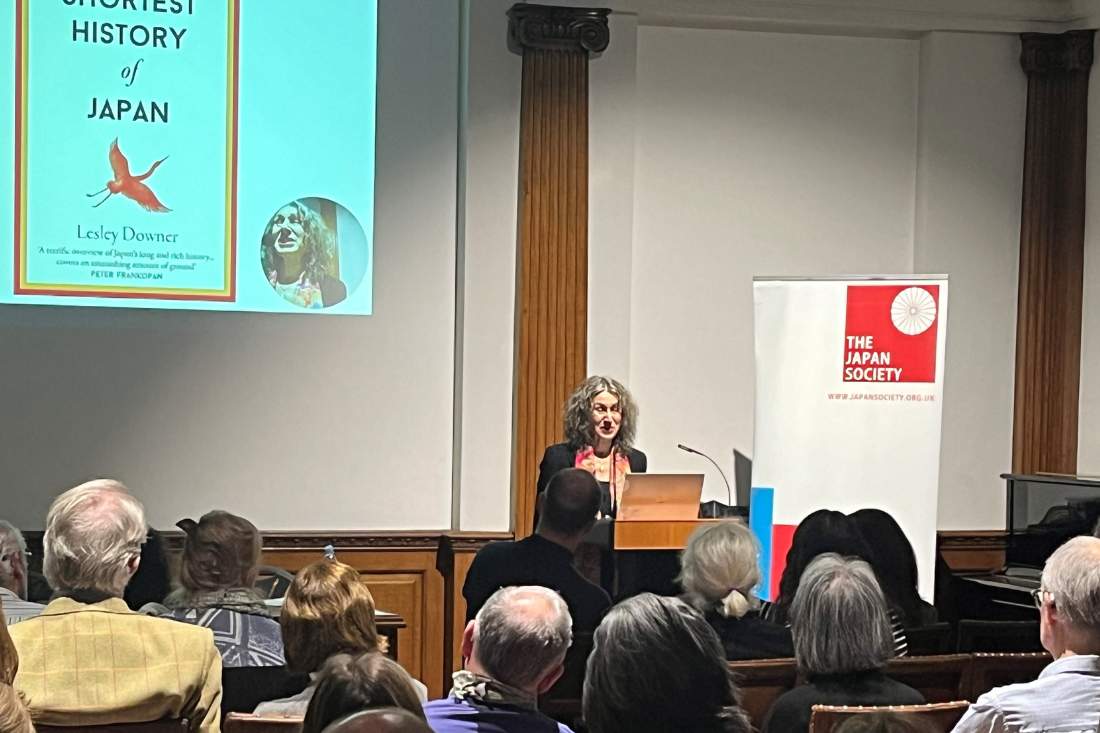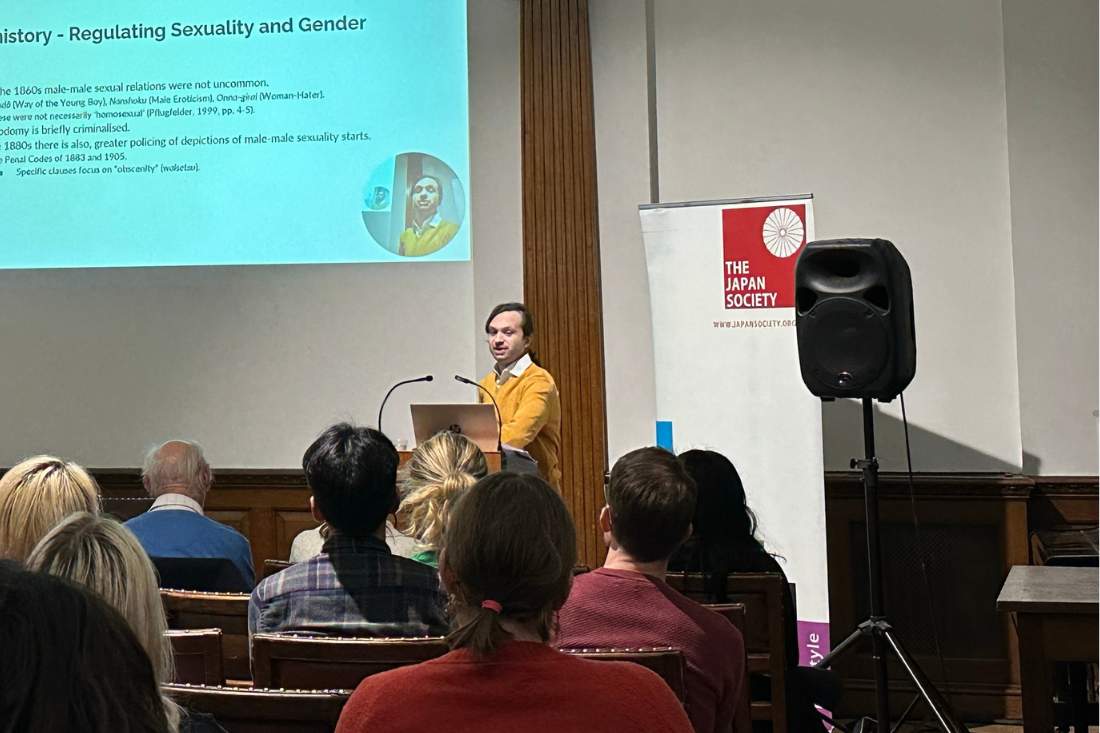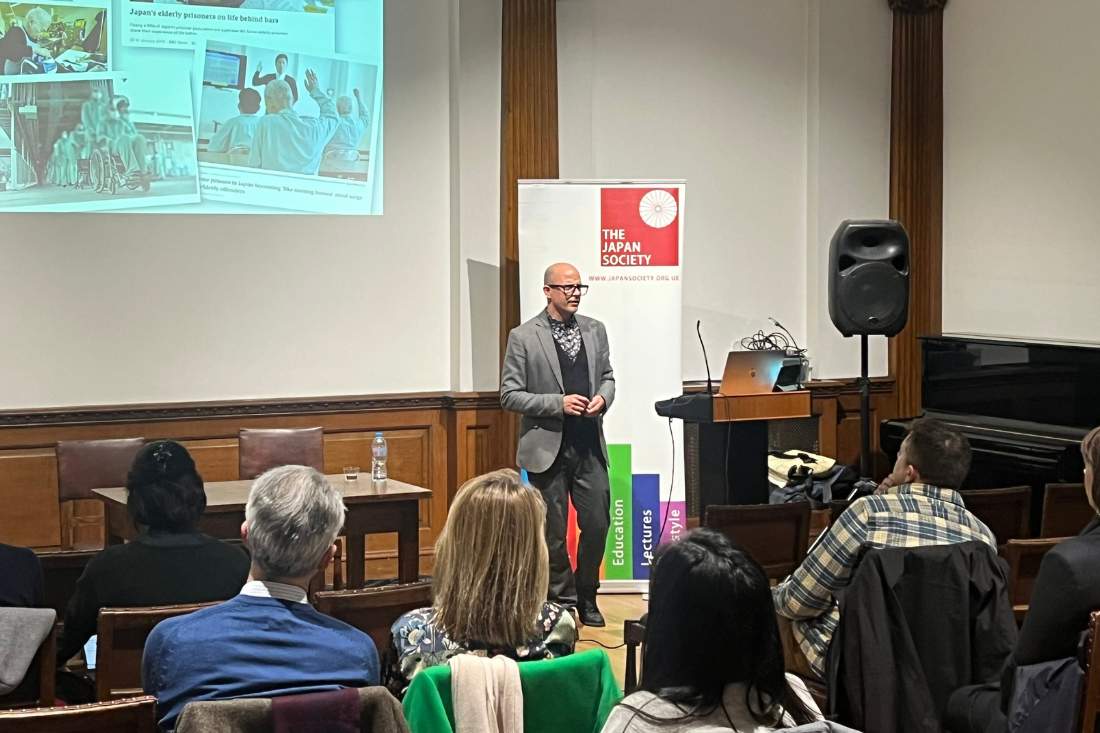The Japan Society Public Lecture Series: October - December 2024

The Japan Society Public Lecture Series hosts monthly lectures delivered by academics and experts on specialised subjects related to Japan and Japanese studies. Lectures are free and open to all at the Swedenborg Society in central London. In October, November and December 2024, we featured an engaging line-up exploring topics such as key female figures in Japanese history, sexuality and gender in the Japanese media during the LGBT Boom, and the criminalisation of older people in Japan.
We would like to thank our speakers Lesley Downer, Callum Sarracino and Dr Jason Danely and everyone attending the lectures. Special thanks to the Toshiba International Foundation for their support.
Below is a review of the lectures conducted in October, November and December 2024.
Click here for upcoming lectures and Join The Japan Society Mailing List to stay informed of future events.
|
Become a member of The Japan Society and have exclusive access to the video recording of most of the lectures and many more events in the "members-only" playlist on our YouTube channel. |
21 October - Court Ladies, Women Warriors and Courtesans. A Hidden History of Japan - Lesley Downer
In this lecture, Lesley Downer explored the often-overlooked but integral roles that women played throughout Japanese history, highlighting key figures, cultural contributions, and the ways in which women influenced both politics and society from ancient to modern times.
Beginning with Himiko, the legendary shaman queen who ruled in 190 AD, Lesley described her supernatural abilities and the authority she wielded over a federation of kingdoms. Himiko’s reign, recorded in Chinese texts, is particularly significant as one of the earliest instances of female leadership in Japan.
Moving through early Japanese history, Lesley discussed notable women such as Murasaki Shikibu and Tomoe Gozen, whose influence helped shape cultural and political development, often quietly but crucially supporting their male counterparts in governance.
Lesley then shifted focus to the Heian period, celebrating women’s literary achievements. She discussed the intellectual sophistication of court ladies, who produced works such as Murasaki Shikibu’s The Tale of Genji, widely regarded as the world’s first novel. Through their writing, women of this era not only contributed timeless literary masterpieces but also provided deep insight into the society and cultural norms of their time.
During Japan’s Warring States period, Downer introduced figures such as Tomoe Gozen, a formidable female warrior whose skill and bravery challenged conventional narratives of warfare as solely a male endeavour. She also explored the roles of women behind prominent warlords, notably Toyotomi Hideyoshi’s wife, Nene-dono, and his concubine Yodo-dono, whose political and emotional influence proved pivotal during periods of conflict and consolidation.
Lesley next discussed the Edo period (1603–1868), illustrating the paradox of restriction and autonomy in women’s lives. She explained how courtesans in the pleasure quarters not only cultivated sophisticated arts and performances but also wielded considerable influence and independence within their social spheres. Simultaneously, the women of the shogun’s palace held quiet yet substantial control over men, underscoring their power in otherwise stratified settings.
To conclude, Lesley explored the Taisho era (1912–1926), when Japan underwent a significant cultural shift. During this time, “modern girls” known as Moga were women who embraced newfound freedoms, pursued careers, and challenged societal expectations. This period marked a turning point in Japanese history, as it planted the seeds for future feminist movements and redefined women's roles in modern society.
Throughout the lecture, Lesley challenged the traditionally male-centred narrative of Japanese history by centring the experiences, power, and creativity of women. Her examination shed light on their crucial roles in warfare, politics, and culture, weaving a compelling and rich story of women’s contributions across centuries.
25 November - The LGBT Boom: Queerness in the Japanese Media since 2010 - Callum Sarracino
In this lecture, Callum H. Sarracino examined the development of queer representation in Japanese media, tracing its historical roots and culminating in the "LGBT Boom" of the 2010s and 2020s.
Beginning with a historical overview, Callum described how male-male relationships and schoolgirl romances were once normalised in pre-modern Japan, before the Meiji government’s policies sought to regulate sexuality and enforce patriarchal family structures. By the early 20th century, Western sexology introduced terms such as Dōseiai (same-sex love), which reshaped how queerness was discussed in Japan.
Callum then explored the emergence of queer themes in manga from the 1960s to the 1990s, with genres like Shōnen-ai and Yaoi capturing male-male romance for primarily female audiences. He highlighted works such as Banana Fish and Ranma ½, which pushed the boundaries of gender and sexuality representation, before turning to the “Gay Boom” of the 1990s, which saw the growth of queer activism, life writings, and professional Boys Love and Yuri genres.
Moving into the 2000s, Callum discussed the “Onē-kyara Boom,” a period that brought transgender figures into mainstream media but also saw a conservative backlash against gender-inclusive policies.
The main focus of the lecture was the “LGBT Boom” in Japan, characterised by the increasing use of the term “LGBT,” heightened media representation, and the symbolic role of same-sex marriage in both activism and commodification. Callum noted the ambiguous nature of many portrayals, as seen in works like Gundam G-Witch, and the rise of fan-driven criticism pushing for more explicit representation.
Callum concluded by emphasising that queer themes have been a continuous presence in Japanese media, shaped by cycles of commodification, international influence, and societal change. Rather than isolated trends, these booms highlight shifting priorities in the ongoing representation of queerness.
16 December - An Unsettled Future: Life after Prison in Japan’s Ageing Society - Jason Danely
Jason Danely’s lecture, "An Unsettled Future: Life after Prison in Japan’s Ageing Society," explores the intersection of ageing, social isolation, and the criminal justice system in Japan, highlighting how structural challenges contribute to the marginalisation of older people. Jason frames Japan as a demographic pioneer, having the oldest population globally for over four decades, a phenomenon marked by increased longevity and declining birth rates. Despite its image as a model for longevity, many older Japanese struggle with isolation, poverty, and insufficient care, leading to a troubling rise in older people’s arrests and incarcerations.
Drawing from five months of fieldwork in Tokyo in 2018, Jason shares personal testimonies and statistical insights that reveal a high rate of recidivism among older prisoners, a phenomenon contrary to conventional criminological theories. Many inmates are incarcerated for minor crimes, such as shoplifting, committed not out of malice but due to desperation and the lack of social support. Jason emphasises the difficulty of reintegration for older ex-prisoners, who often face stigma, loneliness, and a "wall" of disconnection from society.
A central theme is the critical role of kinship and community in addressing these issues. Jason discusses grassroots initiatives, such as the non-profit "Mother House," which provides formerly incarcerated older individuals with shelter and emotional support. Led by a former prisoner, the organisation fosters a familial environment that transcends traditional kinship structures, promoting intergenerational and inter-relational bonds.
The lecture underscores the broader implications of Japan’s ageing society for other countries. Jason challenges the audience to rethink justice and kinship, advocating for a shift from punitive systems to community-based solutions that address the root causes of isolation and recidivism. By celebrating interconnectedness and expanding notions of family, he envisions a society where alternatives to incarceration are not only possible but transformative.
Supported by the Toshiba International Foundation (TIFO)





